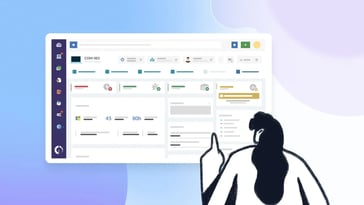Are you searching for the ideal tool to enhance your IT Service Management (ITSM) project? If so, the comparison between ServiceNow vs. Cherwell is likely on your radar.
In this blog post, we'll delve deep into the ServiceNow vs. Cherwell debate, exploring their features, strengths, and weaknesses. And in case these options don't meet your specific needs, we'll also introduce you to InvGate Service Management, a compelling service desk software alternative that could be the perfect solution for you.
Join us to make an informed decision and unlock the full potential of your IT service delivery.


TL;DR
- ServiceNow's advantages include continuous product enhancements, integration capabilities, and native AI capabilities. However, users dislike its high licensing costs, the steep learning curve, the challenges in customizing workflows, and the delays during implementation.
- Cherwell Service Management's positive aspects include its user-friendly interface, extensive customizability, and Low-Code/No-Code approach. However, users dislike that Ivanti purchased it, and the company is now pushing towards Ivanti Neurons. In addition, they highlight performance issues and customization challenges.
- InvGate Service Management is praised for its ease of use, high customization, and Low-Code/No-Code capabilities. It has short implementation times and a robust support team in English and Spanish.
We tried to be as thorough as possible, but if you don't have enough time to read it through and through, here's (another) TL;DR: InvGate Service Management can do everything we say here, and you can test it right away for free for 30 days.
Most looked-at features by buyers
When evaluating ITSM solutions, buyers often prioritize certain features that align with their organizational needs. Understanding which features buyers most sought after can help make an informed decision.
Let's explore the key features potential buyers tend to focus on during the ITSM tool comparison process.
- Customization and flexibility - Buyers are keen on finding a solution that offers extensive customization options and flexibility. They look for the ability to tailor the system to their unique processes and workflows without requiring extensive coding or scripting.
- Ticketing and Incident Management - Buyers seek robust ticketing systems as part of their help desk software to effectively handle and track customer issues or incidents. Some features include ticket creation, assignment, tracking, prioritization, SLA Management, and escalation workflows.
- Automation and Workflow Management - Efficient automation and workflow capabilities are crucial considerations for buyers. They seek platforms that enable streamlined processes, eliminate manual tasks, and improve overall operational efficiency.
- Integration capabilities - Integration with other systems and applications is another critical factor for buyers. They want a solution to connect seamlessly with existing tools and technologies within their IT ecosystem.
- Self-service portal and knowledge base - Buyers look for self-service portals that empower end users to resolve common issues independently, access knowledge bases, and submit service requests easily.
- Reporting and analytics - Buyers emphasize the importance of robust reporting and analytics capabilities. They seek platforms that provide comprehensive dashboards and reports to gain insights into their IT operations, service performance, and essential metrics.
- Scalability and performance - As organizations grow, scalability and performance become essential considerations. Buyers seek solutions that can handle increased workloads and maintain optimal performance without significant disruptions.
- IT service catalog - Organizations often need an IT service catalog that enables users to request specific IT services or resources. This functionality simplifies the process of service requests, enhances visibility into available services, and facilitates effective service delivery management.
- Pricing and support - Buyers assess the pricing and support aspects of the solution, considering its cost-effectiveness, such as licensing models, subscription plans, and any additional expenses associated with features or users. The availability of customer support, documentation, and training resources also influences their decision-making process.
- User experience and interface - Buyers take into account the user experience and interface of the platform, as they value a user-friendly design that promotes easy adoption and enhances productivity. An intuitive interface is fundamental, and organizations with remote or mobile workforces also consider the mobile accessibility of the platform.
What is ServiceNow?
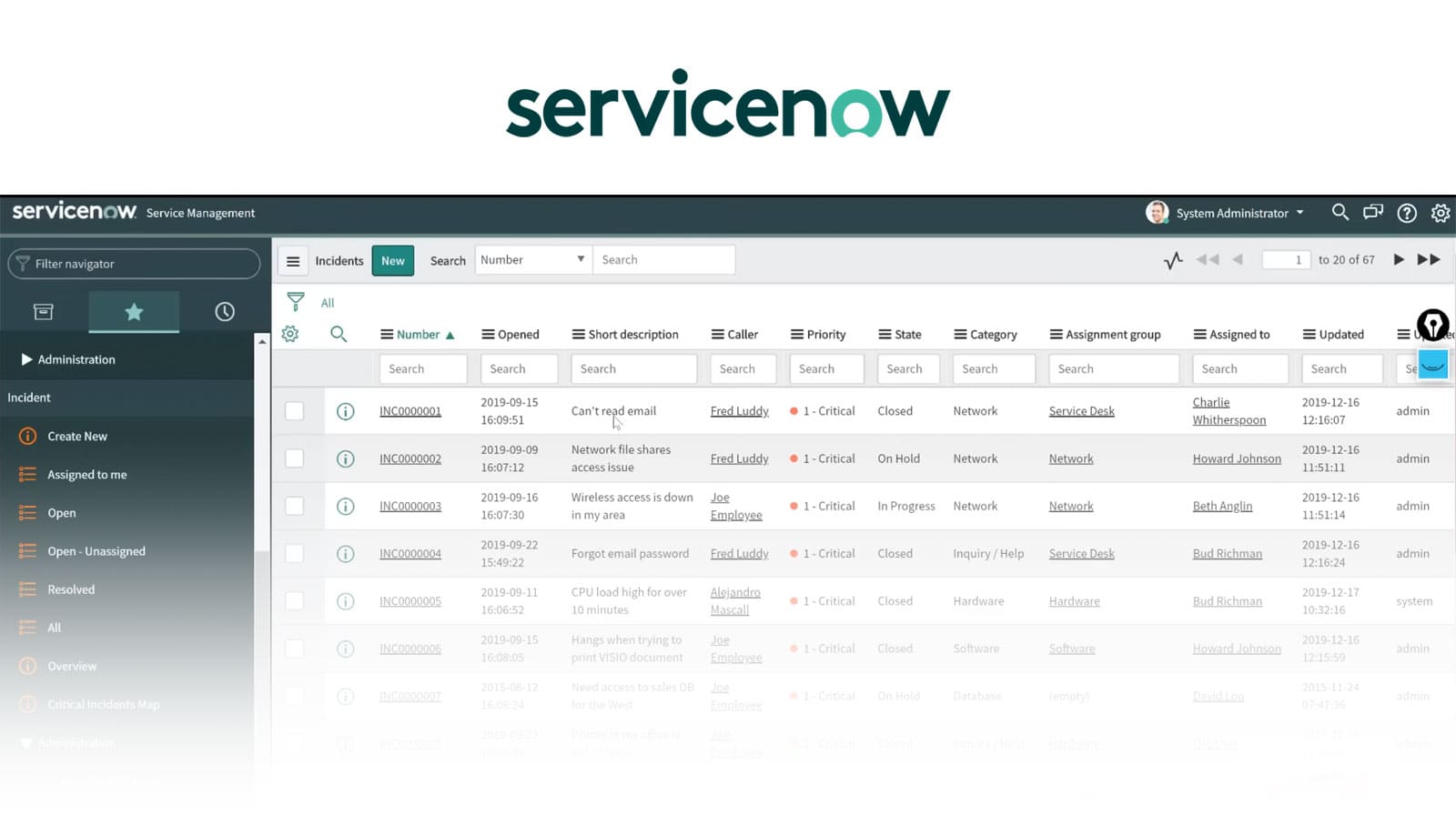
ServiceNow is a company that offers a cloud-based platform designed to streamline IT Service Management (ITSM) and digital workflows for organizations. Its main focus is on simplifying and automating IT operations, improving customer experiences, and driving digital transformation for businesses.
Established in 2004 and based in Santa Clara, California, it provides a comprehensive range of cloud-based solutions tailored to meet the needs of different enterprise operations. Their solutions encompass various areas such as IT Service Management, IT Operations Management, IT Business Management, Customer Service Management, Human Resources Service Delivery, Security Operations, and more. They have formed strategic partnerships with renowned companies like NVIDIA and Juniper Networks, which further contribute to their strong presence in the market.
What users like from ServiceNow
ServiceNow has received positive feedback from customers, as indicated by reputable sources like Gartner and G2. Here are some advantages that have been highlighted.
- Growing user community - ServiceNow has a thriving and rapidly expanding community of users. It is highly regarded within the industry, and many customers discover or gain knowledge about the product through recommendations from their peers.
- Continuous product enhancements - ServiceNow consistently introduces improvements to its products through acquisitions and internal development. They provide customers with a transparent product roadmap, ensuring visibility into upcoming features and enhancements.
- Expanded usage in various domains - Customers not only utilize ServiceNow for IT Service Management (ITSM) but also extend its usage to other areas such as Human Resources (HR), Customer Engagement Center (CEC), Governance, Risk, and Compliance (GRC), and IT Operations Management (ITOM).
- Cloud-based platform - ServiceNow's cloud-based approach allows organizations to scale their operations, provides flexibility, and ensures accessibility from any location.
- Integration capabilities - ServiceNow's features enable seamless integration with other systems and applications, facilitating smooth data flow and interoperability.
- Native AI capabilities - ServiceNow incorporates the power of artificial intelligence (AI) and machine learning (ML) into its platform, offering built-in AI functionalities. These include virtual Agent chatbots and predictive intelligence, which enhance the user experience.
What users don’t like from ServiceNow
While ServiceNow possesses numerous strengths and positive attributes, there are also certain concerns and dislikes expressed by customers regarding the platform. Analysis from reputable sources like Gartner and G2 has highlighted the following dislikes.
- High licensing costs and potential additional expenses - ServiceNow's comprehensive functionality and advanced features come at a significant cost. Licensing fees can be substantial, especially for organizations that require capabilities beyond ITSM. The overall cost of ownership can be further increased by potential additional expenses for customizations or specialized modules.
- Renewal leverage concerns - ServiceNow's dominant market position may limit customers' ability to renegotiate contracts without compromising their existing discounts.
- Steep learning curve and complexity for new users - Some users find ServiceNow's platform challenging to learn, particularly when attempting to utilize its more advanced features. The system's complexity may require additional training and resources to ensure users can effectively leverage its capabilities.
- Challenges in customizing workflows and processes - The platform may have limitations in terms of flexibility and customization options, making it difficult for organizations to tailor the system to their specific needs and unique business processes.
- Difficulties and delays during implementation - Organizations may encounter difficulties during the configuration, data migration, or integration stages of implementing ServiceNow, resulting in longer timelines for implementation.
- Mixed feedback on customer support - Some users have expressed concerns about response times and accessibility when seeking assistance from ServiceNow's customer support.
- Limited presence in emerging markets - ServiceNow has a limited presence in certain emerging markets, with fewer local offices and a lack of hosting options in regions such as the Middle East.
What’s ServiceNow’s argument over Cherwell?
ServiceNow presents several compelling arguments that distinguish it from Cherwell. Let's delve into their key differentiators.
- Industry leadership and recognition - ServiceNow enjoys widespread industry recognition and is regarded as a leader in the ITSM space. Its extensive customer base, global presence, and proven track record establish it as a trusted and preferred solution among organizations across various industries.
- A comprehensive suite of solutions - ServiceNow offers a comprehensive suite of integrated solutions that extend beyond ITSM. With modules for IT Operations Management (ITOM), IT Business Management (ITBM), Customer Service Management (CSM), and more, ServiceNow provides a holistic platform that allows organizations to streamline multiple operational functions and achieve a unified view of their operations.
- Advanced automation and intelligence - ServiceNow places a strong emphasis on automation and intelligence. With native AI capabilities and machine learning functionalities, ServiceNow incorporates automation into its platform, enabling organizations to automate routine tasks, optimize workflows, and drive operational efficiencies. Virtual Agent chatbots and predictive intelligence enhance the user experience and deliver proactive services.
- Scalability and flexibility - ServiceNow offers enterprise-grade scalability and flexibility, ensuring that organizations can scale their operations and adapt to changing business needs. The cloud-based platform provides accessibility from anywhere and accommodates growing user bases and diverse operational requirements.
- Strong integration capabilities - ServiceNow boasts robust integration capabilities, enabling seamless connectivity with other systems and applications. This facilitates data flow, interoperability, and the creation of a connected IT ecosystem, empowering organizations to leverage their existing technology investments.
- Thriving user community - ServiceNow has a thriving and rapidly expanding user community that serves as a valuable resource for customers. Through peer recommendations and knowledge sharing, organizations discover the product's benefits and gain insights into best practices and implementation strategies.
- Continuous product enhancements - ServiceNow consistently introduces product improvements through acquisitions and internal development. The company maintains transparency by sharing its product roadmap with customers, offering visibility into upcoming features and enhancements.
What is Cherwell?
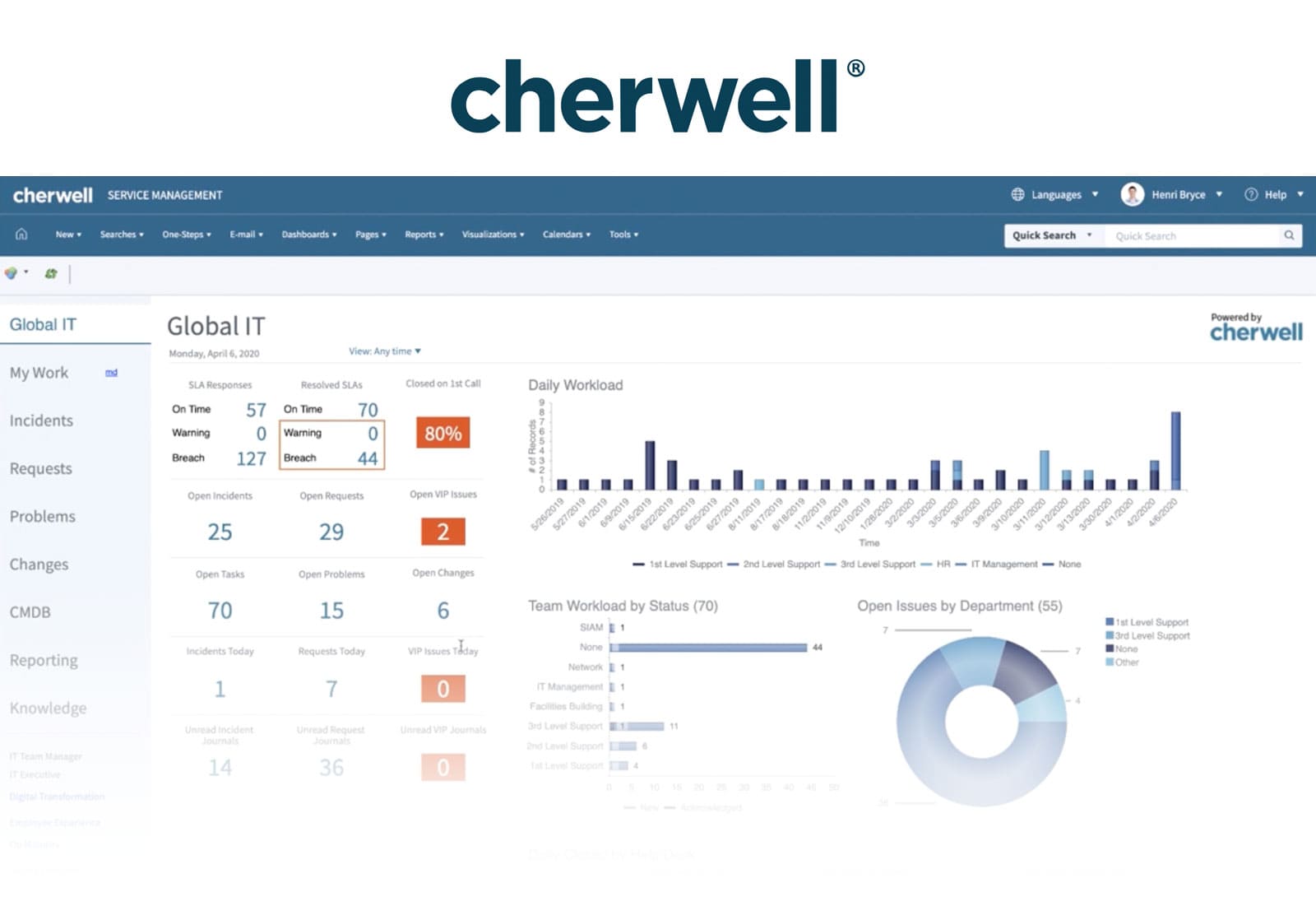
Cherwell Service Management by Ivanti is an IT Service Management (ITSM) platform that effectively caters to the requirements of service departments without the need for coding or scripting. It stands out by providing automated IT service delivery through an extensive out-of-the-box toolset.
Some notable features of Cherwell Service Management include a codeless architecture for business agility, drag-and-drop functionality that enables easy customization, and automated workflows to eliminate the need for time-consuming manual processes.
In addition to these features, Cherwell Service Management includes Project Management capabilities and a unique feature called Mergeable Applications ('mApps'). These mApps allow users to share custom applications, extensions, and enhancements without affecting the core system functionality.
Furthermore, Cherwell Service Management provides multi-language support and offers deployment options as a Software-as-a-Service (SaaS) solution and on-premise deployment. Additionally, it supports integration with Ivanti Neurons, a platform that brings predictive, self-healing, and autonomous remediation capabilities to enhance system performance and security.
What users like from Cherwell
Customers have praised various positive aspects of Cherwell, as evidenced by analyses conducted by reputable sources like Gartner. Here are some of the benefits that have been mentioned.
- User-friendly interface - Cherwell Service Management offers an intuitive and user-friendly interface that can be easily customized to suit individual preferences.
- Extensive customizability - Users appreciate the high level of customization options available in the platform, allowing them to tailor various aspects of the system, such as form fields and workflows, to their specific needs.
- Low-code/No-code approach - The platform's low-code/no-code environment enables users to quickly set up and implement new features without extensive coding knowledge or expertise.
- Automation and Workflow Management - Cherwell excels in automation capabilities, making it easy for users to design and implement varying complex workflows according to their requirements.
- API integrations - The platform's support for API integrations enables seamless connectivity with other systems, enhancing its overall functionality.
What users don’t like from Cherwell
While Cherwell possesses numerous strengths and positive attributes, customers have also voiced their concerns and dislikes regarding certain platform aspects. Based on analysis from reputable sources such as Gartner, here are some of the dislikes mentioned.
- Disruption from acquisition and sales push - Following Ivanti's acquisition of Cherwell Software, customers have expressed dissatisfaction with the aggressive sales push towards Ivanti Neurons, an alternative platform. The sudden change and shift in focus have not been well-received by Cherwell's existing customer base, causing dissatisfaction among them.
- Performance issues - Some users have experienced performance issues, mainly when dealing with large databases or extensive groups of technicians, which can impact system responsiveness.
- Customization challenges - While Cherwell offers extensive customizability, some users have found certain development and customization tasks complex and time-consuming, particularly when creating new Business Objects and Forms.
- Bugs and issues with upgrades - Users have reported encountering bugs and experiencing challenges during platform upgrades, with some releases being poorly planned and resulting in problems that need to be addressed.
- Outdated user interface - Some users find the graphical user interface (GUI) to be obsolete and less responsive than desired, especially when comparing the web version to the desktop application.
- Customer support - The level of support provided has received criticism from some users, citing slow response times and perceived reluctance to acknowledge software behavior as bugs.
What’s Cherwell’s argument over ServiceNow?
Cherwell presents its own compelling arguments that differentiate it from ServiceNow and make it a competitive choice for organizations. Here are key points in Cherwell's argument over ServiceNow.
- User-friendly interface and high customizability - Cherwell Service Management boasts an intuitive and user-friendly interface that can be easily customized to suit individual preferences. Users appreciate the high level of customization options available, allowing them to tailor various aspects of the system, such as form fields and workflows, to their specific needs.
- Low-code/No-code approach - Cherwell's environment enables users to quickly set up and implement new features without extensive coding knowledge or expertise. This approach simplifies the development and customization process, empowering organizations to drive innovation and adapt the platform to their evolving requirements with ease.
- Automation and Workflow Management - Cherwell excels in automation capabilities, making it easy for users to design and implement varying complex workflows according to their requirements. This robust automation framework streamlines processes, reduces manual efforts, and increases operational efficiency.
- Seamless API Integrations - Cherwell supports seamless integration with other systems and applications through its API capabilities. This enables organizations to connect Cherwell with their existing IT infrastructure and leverage their investments in other tools, fostering interoperability and maximizing the value of their technology stack.
- Cost-effective solution - Cherwell offers a cost-effective alternative to ServiceNow, providing organizations with competitive pricing models and licensing options.
- Personalized customer support: Cherwell prides itself on delivering personalized and responsive customer support. Customers can expect prompt assistance, reliable guidance, and a partnership-focused approach to address their specific needs and challenges.
- Focus on ITSM excellence - While ServiceNow offers a broad range of solutions beyond ITSM, Cherwell concentrates its efforts on delivering outstanding ITSM capabilities. This focused approach allows Cherwell to fine-tune and excel in providing comprehensive IT Service Management functionality, empowering organizations to optimize their IT service delivery.
Considering InvGate Service Management as an ITSM solution alternative

While ServiceNow and Cherwell are well-known players in the ITSM space, it's essential to explore alternative solutions that might better align with your organization's unique needs. In this regard, InvGate Service Management emerges as a compelling alternative worth considering.
Let's take a look at some of the highly beneficial aspects of InvGate Service Management that deserve your consideration.
1. Powerful Ticketing and Incident Management
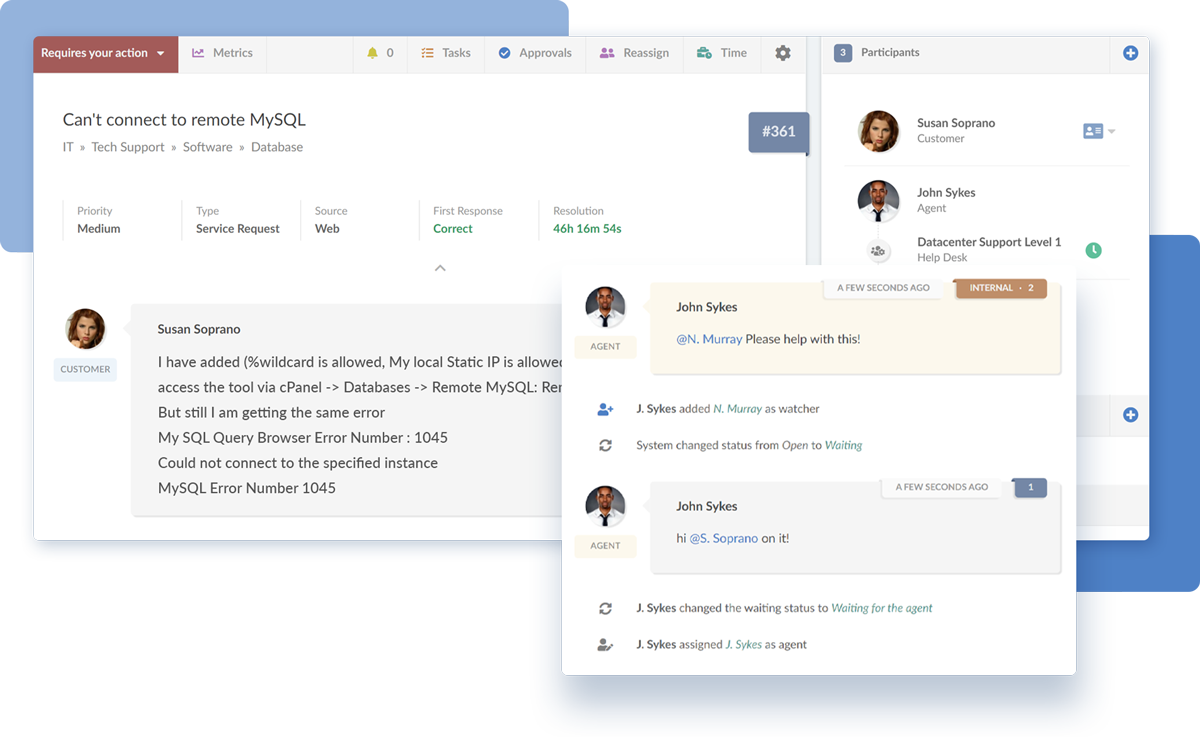
InvGate Service Management excels in its robust Ticketing and Incident Management capabilities. It facilitates efficient ticket tracking, collaboration, and resolution, empowering IT teams to manage and prioritize incidents effectively. Automated routing, customizable workflows, and SLA management enhance the efficiency of incident resolution processes.
2. Intuitive and user-friendly interface
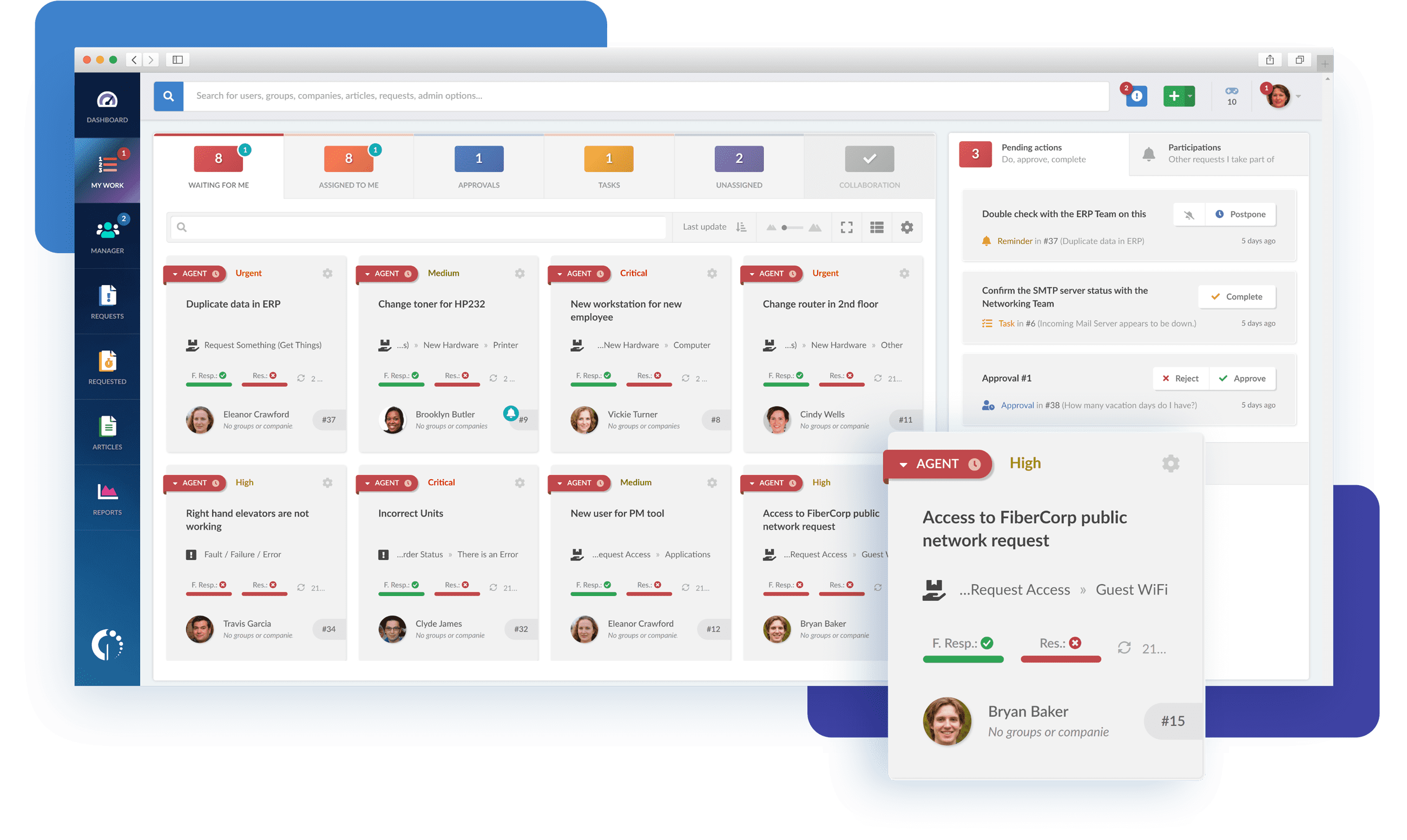
InvGate Service Management presents an interface that is both intuitive and user-friendly, ensuring effortless navigation for IT teams and end-users alike. The streamlined design and intuitive workflows guarantee a smooth user experience, reducing the learning curve for new users.
3. Comprehensive reporting and analytics
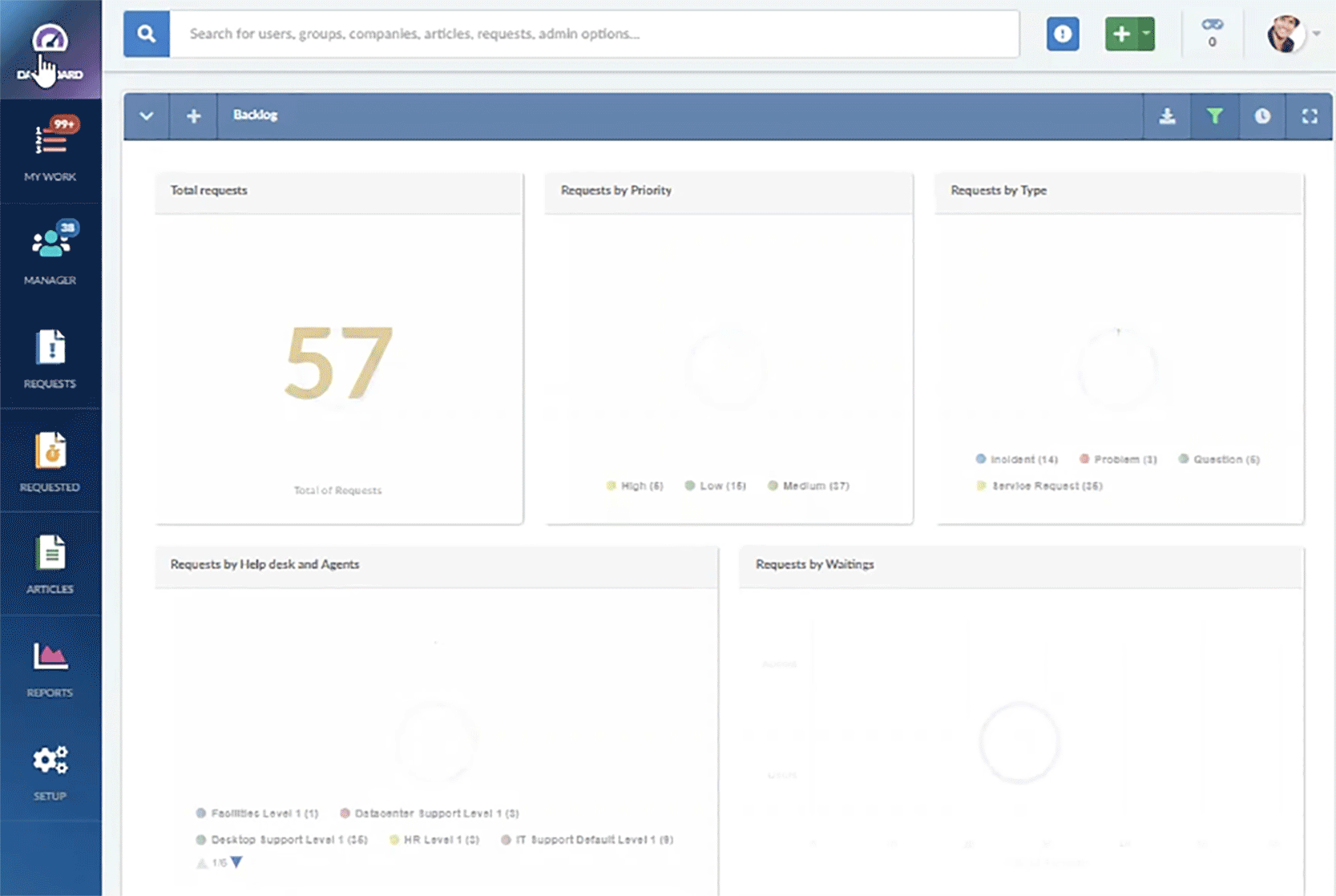
InvGate Service Management offers comprehensive reporting and analytics functionality, enabling organizations to gain valuable insights into their IT operations and performance. The platform provides pre-built reports and dashboards, along with the flexibility to create custom reports, empowering IT teams to analyze data, identify trends, and make informed decisions for service improvement.
4. Customization and flexibility
 With InvGate Service Management, organizations enjoy a high degree of customization and flexibility. The platform can be easily configured and adapted to align with specific IT processes and business requirements, delivering a personalized ITSM experience.
With InvGate Service Management, organizations enjoy a high degree of customization and flexibility. The platform can be easily configured and adapted to align with specific IT processes and business requirements, delivering a personalized ITSM experience.
5. Cost-effective solution
InvGate Service Management offers a cost-effective solution without compromising functionality. It provides a robust set of ITSM features and capabilities at a competitive price point, making it an attractive option for organizations seeking a balance between affordability and functionality when compared to alternatives like ServiceNow and Cherwell Service Management.
6. Self-service capabilities
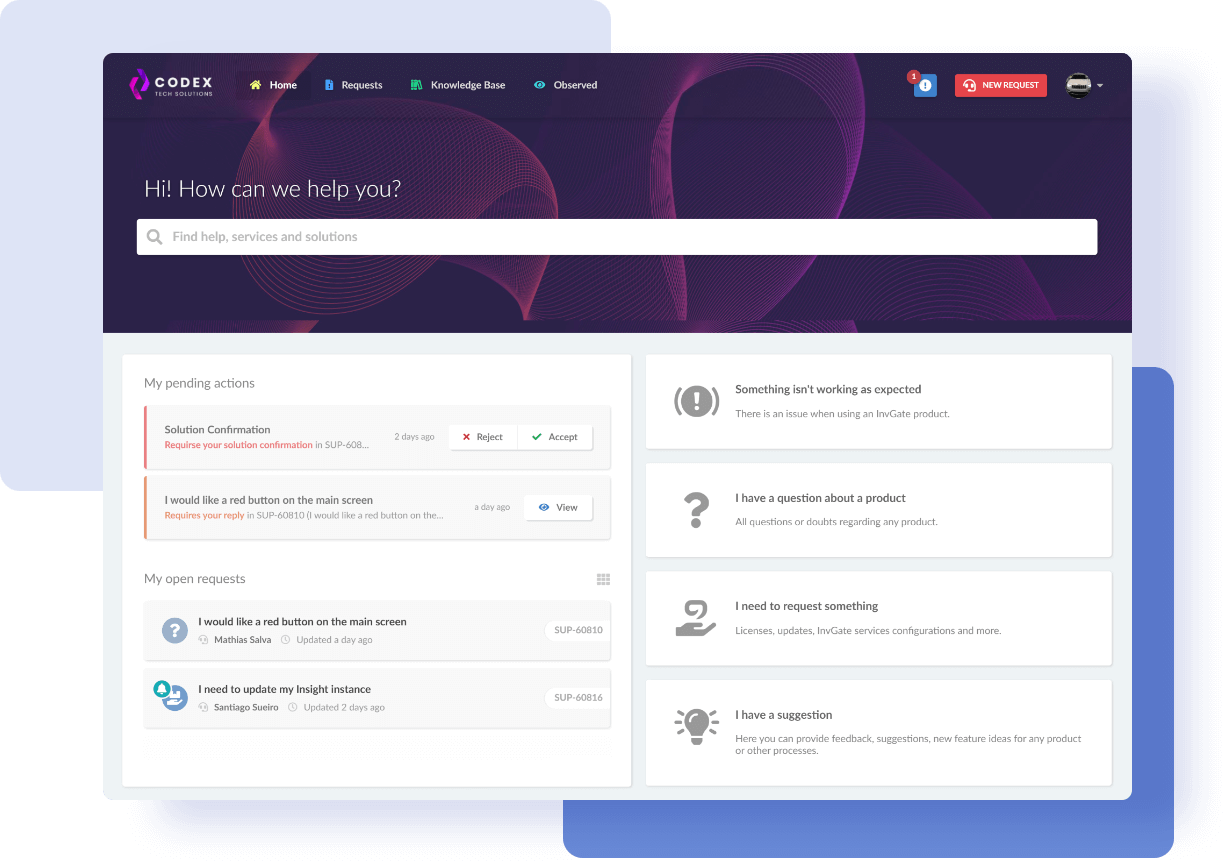
InvGate Service Management includes robust self-service capabilities, such as a user-friendly self-service portal, an extensive IT service catalog, and a knowledge base. These features empower end-users to find answers to common issues independently, access a wide range of IT services, and leverage self-help resources, resulting in improved efficiency and reduced strain on IT teams.
7. Comprehensive Asset Management
InvGate Service Management is a fit-for-purpose Service Desk solution with integrated Asset Management, allowing organizations to track and manage their IT assets throughout their lifecycle effectively. It contains features such as IT Asset Discovery, Inventory Management, Software License Management, and maintenance scheduling.
8. AI-powered features
InvGate Service Management leverages AI-powered features like Support Assist and AI-Improved Responses. Support Assist utilizes machine learning algorithms to automate ticket categorization and routing, enhancing Ticket Management efficiency. AI Responses employs AI to assist agents in replying to tickets, saving time and improving the quality of customer interactions.
Next steps
Choosing the right ITSM solution is a critical decision that can have a significant impact on your organization's IT service delivery and overall performance. By taking the time to evaluate your options thoroughly, you will be on the right track to implementing a solution that meets your needs and goals.
Request InvGate Service Management 30-day free trial to witness firsthand how it can enhance your business operations. Additionally, download our free ITSM implementation checklist to assist you in charting out your next course of action.















